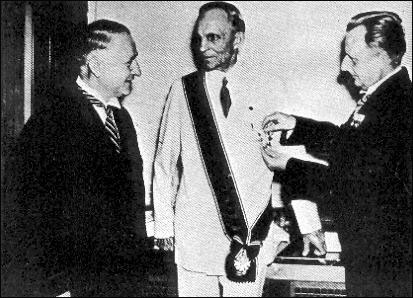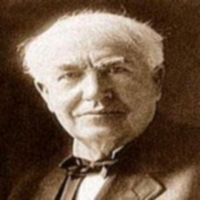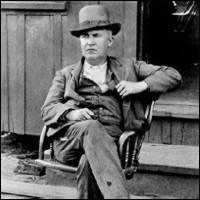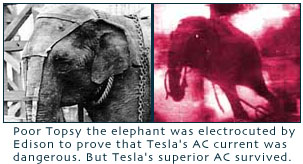
|
"It is impossible for a man to learn what he thinks he already knows." - Epictetus A few years ago, I became interested in that American hero, Thomas Alva Edison. We all grow up within myth-making cultures, and we all absorb the myths, even participating in their perpetuation. Something that I had read, seen, or heard about Edison had suddenly begun to mythologically smell.
I discovered that Tom Edison once said, "If I didn't invent the incandescent lamp, I never invented anything." I had to wonder if he said that sporting a wry grin like P. T. Barnum when he made his infamous quip, "There's a sucker born every minute." Or was he grimacing as he angrily defended himself against charges of exaggerating his claim? Well of course he didn't invent the incandescent lamp, not even close. A vast array of inventive people had begun developing it perhaps decades before it was even a twinkle in noble Tom's eye. Apparently when he patented his "new invention", he infringed on Joseph Swan's patents and lost the court battles to prove it! This alone began to throw a different light upon the man's character.
As the biography program continued I saw Tom Edison in later years sitting on his porch, having breakfast, performing his daily ritual of going through stacks of foreign and domestic newspapers, his shop/laboratory filled with employees who kept their jobs by inventing for him. "What was he going through all those newspapers for?", I wondered aloud. Then I remembered another of his quotes, "The secret of creativity is knowing how to conceal your sources." No kidding, he really said that. He also said, "Anything that won't sell, I don't want to invent." He was beginning to look more like the classic American business hero, out to make his millions, and "inventing" a new way to accomplish that. I wondered if he invented the now standard practice of taking all credit, patents, copyrights, and profits from anything created by an employee. He certainly practiced it.
 [Above: Henry Ford's reward from Hitler finally came in July 1938, when on his seventy-fifth birthday he was awarded the Grand Cross of the Supreme Order of the German Eagle. Ford was the first American and the fourth person in the world to receive this medal, which was the highest decoration that could be given to any non-German citizen. Benito Mussolini, another of Hitler's financiers, had been decorated with the same honor earlier that year.]
Nowadays I wonder just what Thomas Alva Edison really did invent. Who and what was he really. And I think again of Odysseus and Washington. No way do I believe the Odyssey was purely as advertised. And George Washington? Maybe he was the "father of our nation" in some meaningful sense. He wasn't the first President of the USA though. John Hanson was congratulated by Washington himself for holding that distinction. But today John is ignored due to a technicality: the nation didn't have its constitution yet. Maybe historians don't want us to think about the "first post-revolution" president because we might change our understanding of the American Revolution itself. Americans aren't supposed to like "revolutionaries." Also, our revolution wasn't even a revolution, was it? Revolutions overthrow established governments and replace them with different ones, like the French and Russian revolutions. We certainly didn't do that. King George remained in power. We just rebelled, seceded, and separated like the American South attempted to do some decades later. Maybe that's why President Hanson and the original "Articles of Confederation" are so little discussed. And what about Washington? According to an eye-opening book entitled, The Founding Finaglers, by Nathan Miller, Colonel George Washington became the richest man in the colonies by stealing much of the the land promised to his soldiers of the First Virginia Regiment shortly before independence was declared. He made certain to get all the best bottom land parcels too. We don't hear much about his deprived soldiers or Tom Edison's workers for that matter. They probably didn't get much for their inventive labor either, but then my view is probably prejudiced, being working class. Can you tell? So don't dig too deeply into the details about heros. You may be surprised by what you discover. Whether it's about President Lincoln (many interesting revelations of late), or the Wright brothers (probably weren't the first to achieve powered flight), or Alexander Graham Bell (refined but didn't invent the telephone), or Morse, or Marconi. Hell, Shakespeare apparently wasn't even Shakespeare! Bill Gates, founder of Microsoft and so-called "computer genius," actually bought the first computer system from another inventor for about 60 thousand dollars, later selling the license to use it to IBM for millions! We love our myths because they're simple and pretty. Reality isn't. Just look at the American presidents within your own lifetime. If you admire them, you haven't been digging, you've been learning passively. Information is power, or so they say. Information given away by the corporate media has always been contrived for the empowerment of their own interests. Ordinary businessmen are elevated to idols while creative, hard working men are ignored or disrespected. By controlling history, they seek to control the future. So be careful. Look closely at these famous "inventors" and ask yourself: Are these heros really heros? Terry Anthony is a California based author and videographer who writes for Viewzone.
|
 We all know that the tales we hear about the great heros of history, from George Washington back to Odysseus, are probably a bit exaggerated -- Odysseus, perhaps,a bit more than George. So I knew the odor might mean little. But curiosity ruled me and I began to look. I "googled" Edison and labored long into the night reading adolescent level worship site after worship site. Some people seem to see Tom as something of a demigod. So many websites read alike. I began to wonder: why put up a site when there are already innumerable sites saying the exact same thing? Weird. Eventually I stumbled upon a few sites that, of course, led to others where the information sounded more like history than mythology.
We all know that the tales we hear about the great heros of history, from George Washington back to Odysseus, are probably a bit exaggerated -- Odysseus, perhaps,a bit more than George. So I knew the odor might mean little. But curiosity ruled me and I began to look. I "googled" Edison and labored long into the night reading adolescent level worship site after worship site. Some people seem to see Tom as something of a demigod. So many websites read alike. I began to wonder: why put up a site when there are already innumerable sites saying the exact same thing? Weird. Eventually I stumbled upon a few sites that, of course, led to others where the information sounded more like history than mythology.  One day, watching a biography of Edison on TV, I saw the young lad being admired by his elders for his acute business acumen. He did build a successful business at a remarkably young age. He didn't fit the stereotype of the inventor, scientist, or tinkerer though. History is full of them. They're almost always impoverished idealists who are obsessed with their work, sometimes to the point of self-destruction, like Edison's employee
One day, watching a biography of Edison on TV, I saw the young lad being admired by his elders for his acute business acumen. He did build a successful business at a remarkably young age. He didn't fit the stereotype of the inventor, scientist, or tinkerer though. History is full of them. They're almost always impoverished idealists who are obsessed with their work, sometimes to the point of self-destruction, like Edison's employee  I guess he didn't think much of inventors. Weird again. His despicable attacks on and dishonest dealings with Tesla are now legion. Then the biographical program showed a classic old newsreel of Tom with his close friend Henry Ford, out relaxing in the country together, having a barbecue just like regular folks. Close friends with Henry, huh? When I was a kid Henry Ford was a god, but his star has been falling for years now as his close ties with Hitler and the Nazis have gradually unfolded. Now we know that as he was providing industrial aid to help build the Third Reich, he was doing exactly the same thing for Stalin to build the Soviet Empire. So also were a Who's Who of American industrialists. As always, big businessmen sure know how to screw the world, don't they?
I guess he didn't think much of inventors. Weird again. His despicable attacks on and dishonest dealings with Tesla are now legion. Then the biographical program showed a classic old newsreel of Tom with his close friend Henry Ford, out relaxing in the country together, having a barbecue just like regular folks. Close friends with Henry, huh? When I was a kid Henry Ford was a god, but his star has been falling for years now as his close ties with Hitler and the Nazis have gradually unfolded. Now we know that as he was providing industrial aid to help build the Third Reich, he was doing exactly the same thing for Stalin to build the Soviet Empire. So also were a Who's Who of American industrialists. As always, big businessmen sure know how to screw the world, don't they?